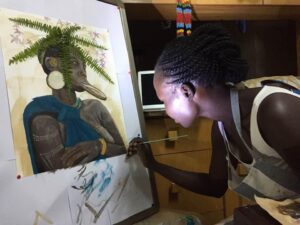A couple of days back, reports covered by Eye Radio emerged about police in Bor, South Sudan harassing young women and girls for their choice of outfits, particularly wearing pants and “short” outfits made headlines. Testimonies from some victims showed that women are stripped naked, beaten on the streets, or even jailed. This is not an isolated incident; women’s bodies belong to the state, communities, and families, particularly to men in South Sudan.
The commodification of women means their worth is clenched to their body, how they dress it and what they use it for and with whom. The usefulness of their existence is only determined by the kind of services their bodies render men, with very minimal bodily autonomy. It’s not surprising that in a town like Bor, the capital of a state where children are being abducted, thousands of people displaced by floods, cattle raiding, and inter-communal violence, a state government and police choose to focus on harassing young women and girls over outfits. This is not just about policing women’s dressing; it is simply a manifestation of a deeper problem, oppression.
All this control is enabled and sustained through shaming, harassing, and abusing women into conformity. That’s why “The Loose Woman” Series by Abul Oyay is such a timely revolutionary act in all its totality. Abul Oyay is a painter, activist, founding member of AnaTaban, and the founder of Baobab Art Foundation, the first of its kind in South Sudan. “The Loose Woman” art exhibition and series of conversations delve into the emotional landscape of a young South Sudanese woman, exploring notions and perceptions, societal expectations, mental awareness, and relationships.

Abul beautifully uses herself as the subject to explore and present the battle between societal expectations and what she wants, something every South Sudanese woman can relate to. She takes women of all walks of life through a journey of self-discovery, expression, and love. She powerfully strengthens creative bonds within the art culture in South Sudan and pushes not only creatives but every single woman beyond the norm. “The Loose Woman is a gift to myself, for me to step in my own power and take control of my being,” she said.
In a country where most young women, regardless of their age, financial and social status, can only move out of their parents/guardians’ homes through marriage straight to their husband’s ‘custody,’ listening to Abul share her experiences on Gender Talk 211 was simply illuminating. She chooses to live alone, unmarried at the age of 35, with no children, and just focusing on what she loves to do and unapologetically. Defying these layers of patriarchal conditioning comes at a great cost for women. I sat through that conversation wondering if Abul understands just how historic “The Loose Woman” series is!
Every single little South Sudanese girl deserves to not only hear that there is more to life than a man, marriage and children but see it, and “The Loose Woman” series is an embodiment of that reality. Abul cracked that ceiling wide open for these young women and girls to see the glimpse of the light beyond these patriarchal societal expectations. Name-calling and shaming are all tools used to harass, humiliate, coerce, stigmatize and silence women who dare to simply exist. In Abul’s words, to all the loose women out there, keep on being loose and keeping on doing what you love. Owning these titles used to degrade women is a step towards taking back our power and control.
